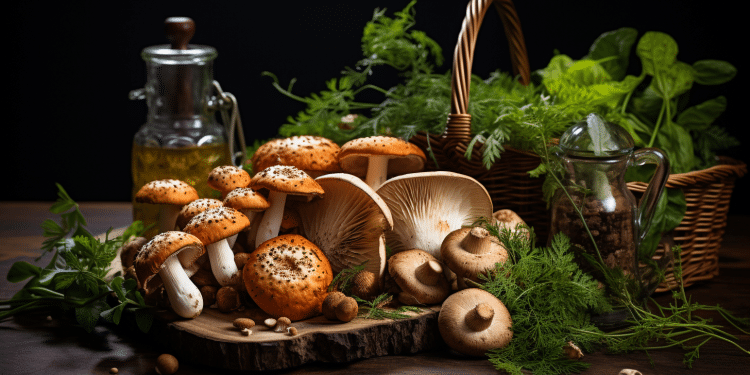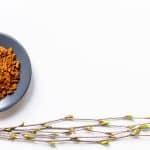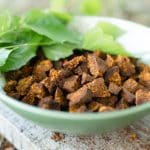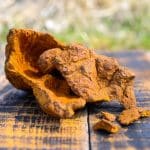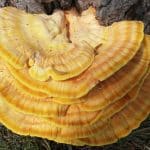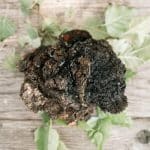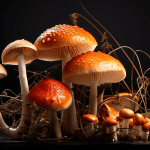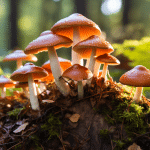Breathe in, breathe out. You might not give it much thought, but breathing is the reason you’re alive. Without oxygen, your body cannot survive. Your lungs not only take in oxygen and release carbon dioxide, but they also protect your other organs from irritants, harmful organisms, and a host of environmental pollutants.
This usually goes on without a thought, yet for many people, breathing can be a struggle. According to the American Lung Association, more than 33 million Americans deal with a chronic lung disease, including asthma, lung cancer, chronic obstructive pulmonary disease (COPD), and pulmonary fibrosis.
Whether you have a chronic condition or you’re dealing with temporary chest congestion, there are natural remedies that can help you. Read on to discover some of the best mushroom for lungs along with herbs and natural supplements that can improve lung health along with some tips to maintain overall well-being for your respiratory system.
Best Herbs and Medicinal Mushrooms for The Lungs
While many herbal remedies claim to improve your lung health, you should always consult with a healthcare provider for their medical advice before taking any new supplements. Below are a few of the natural remedies, supported by science, that can help boost respiratory health.
In addition to being foods, many mushrooms are used as medicines. These are known as the medicine mushrooms. For more than thirty years, in Japan and China, medicinal mushrooms have been approved by the Federal Government to be used along with conventional treatments for cancer.
Among the most powerful, and best studied, mushrooms are turkey tail, reishi, shiitake, cordyceps and maitake. Like most mushrooms, these edible mushrooms are packed with potent antioxidants and beta-glucans, which combat harmful free radicals, and polysaccharides, which may combat a variety of cancers, including lung cancer.
Learn more: Best mushroom for dogs
According to a 2019 report, the most famous active compound in turkey tail mushrooms, polysaccharide K, or PSK, helps patients with lung cancer live longer than those who do not take it. Other studies using reishi have also found its polysaccharides helped boost immune systems of patients suffering from lung cancer. You can get most of these medicinal mushrooms either as raw foods, as powdered extracts, as capsules, or as drinks such as teas and kombucha.
Cordyceps
These parasitic fungi, which grow on insects larvae, may seem unsettling, but the bacterium cordyceps has been used for years in Chinese medicine. Now, modern science is showing they can aid lung health. With over 400 species of cordyceps discovered, two of those that are being studied the most for their health benefits are Cordyceps sinensis and Cordyceps militaris.
One study found Cordyceps militaris reduced inflammation in airways in mice with asthma, possibly because cordyceps helps to produce ATP, the molecule that provides energy to muscles, and may boost breathing ability by increasing the amount of oxygen absorbed into the blood, which is important in pulmonary function. While further studies are needed, one study from 2016 concluded cordyceps sinensis improved the quality of life in people with moderate-to-severe asthma. You can find cordyceps more commonly as a powdered extract.
Ginseng
There are two different types of ginseng: One is Panax ginseng (Asian or Korean ginseng) and the other is American ginseng (Panax quinquefolius). While both these natural nootropics have been used for centuries to aid in everything from energy levels to dry coughs, they each have their own unique health benefits. American ginseng has been shown to decrease mental fatigue and improve cognitive functions dramatically (9), whereas an active compound found in Korean Red Ginseng, called ginsenoside, has been shown to reduce inflammatory responses in the lungs and suppress symptoms of chronic obstructive pulmonary disease, or COPD. You can easily find ginseng in raw form, in capsules, or as a liquid extract as well as a powder.
Learn more: Best mushroom for pain
Curcumin
A natural polyphenol that gives turmeric its vibrant orange-yellow colour, curcumin has been shown to be a potent player in pulmonary health. A 2014 study found that curcumin acts as an anti-inflammatory agent, decreasing the inflammation of airways of mice with asthma, and a 2017 study showed that curcumin suppresses the development of non-small-cell lung cancer. While further clinical trials are needed, findings from the last decade are promising. One reliable way to obtain curcumin is by eating turmeric, either as a spice in food or as a drink.
Lungwort
Named after its green leaves with white spots, which are thought to look like pulmonary tissue, pulmonarywort (also known as Pulmonaria) is a plant long used as a botanical treatment for pulmonary infections. Recently, it has been linked with a number of anti-oxidant properties, as well as the ability to breakdown secretions like phlegm. A 2019 study found that pulmonarywort eases mucous irritation of upper airway mucous membranes, creating a protective, gloop-like film, which is particularly helpful to patients suffering from cystic fibrosis, a life-threatening disease that damages the lungs and digestive system.
Pelargornium
Also known in your local health store as African geranium, or umcka, pelargonium is a powerful plant loaded with antimicrobial and antiviral properties, which aids in the cells of the immune system. Studies show pelargonium may ease respiratory infections like acute bronchitis, sinusitis, or strep throat. In fact, several studies have shown that not only does pelargonium relieve bronchitis and act as an expectorant to remove excess mucus, it is also more effective at doing this than prescribed antibiotics. You can find pelargonium in a liquid extract, cough syrup, or as a capsule, pill, and chewable supplement.
Osha Root
Long used by Native Americans to treat colds, coughs, and a sore throat, and to treat digestive ailments, Osha Root is a plant found throughout the Southwest United States and in the Rocky Mountains. While additional studies on humans are needed to determine its effects on pulmonary conditions, studies show that osha root does indeed possess anti-inflammatory and antiviral effects, which may benefit respiratory problems. Because osha root is difficult to grow commercially, you will typically find it available as sprays, tinctures, and capsules.
Best Ways To Improve Lung Health
For all of the health benefits herbal remedies have to offer, there are always limits to what they can do. Keep the following tips in mind.
Stop Smoking
It is such a self-evident claim, yet one that cannot be emphasized enough. As of May 2019, the World Health Organization confirmed that tobacco kills as many as half of those who use it, translating into over 8 million deaths every year.
Take a 2nd Look At Essential Oils
Because essential oils are naturally occurring, it is tempting to assume they are great for everybody. But this is not necessarily true all of the time.
Peppermint oil, for instance, is popular because of its aromatizing compound, menthol, which seems to open up the airways and remove mucus. However, the side effects of it are well documented. Peppermint oil may be irritating if applied to skin or if smoked via nose.
Practice Breathing Exercises
The American Lung Association recommends two types of deep breathing exercises to enhance pulmonary health. One is the bagging breathing method, which is just inhaling through your nose and out through the mouth for at least two times that time, using the bagging lips. The other is deep breathing, or diaphragmatic breathing.
This requires you to breath in through the nose as well, but it is focused on filling the stomach with air. Once your diaphragm is filled, breathe slowly out through your mouth for at least two or three times the length of the breath you took in.
Studies have found that deep breathing, combined with some aerobic exercise, improves oxygenation in patients with COPD and asthma. It is important to note that you should not perform these types of deep breathing exercises if you are experiencing shortness of breath. Wait until you are feeling good, and then start doing these two exercises for around five to 10 minutes each day.
Try Regular Exercise
From mental to physical to emotional well-being, exercise is critical for your overall wellbeing. Studies like those mentioned above suggest regular exercise helps keep your lungs functioning correctly, keeping you feeling strong in more ways than one.
Unless you are having trouble breathing, chances are that you do not think all that much about how important your lungs are to keeping you healthy. But if you keep the herbs and natural remedies mentioned above in mind, along with following the actionable steps laid out in this guide, your breathing system will stay healthy and happy every single breath you take.
